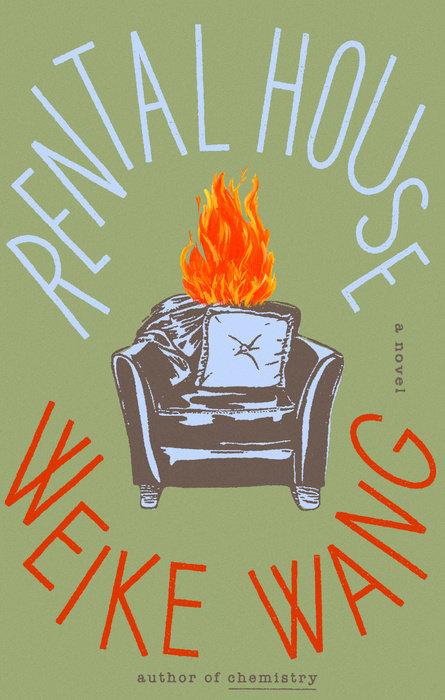Rental House

She had started looking in winter, browsing rental sites recommended by friends who went away for long periods of summer and knew about this stuff. They knew which towns along the Cape had the cleanest beaches, which towns on Nantucket were the most kid friendly, and which ice cream stands the Obamas frequented on the Vineyard. These tips she wrote down on a notepad. Martha’s Vineyard = Obamas = ice cream. She’d marked kid‑friendly places as ones to avoid. She and her husband of five years had discussed visiting the Cape before, but for five years had not. It was decided that this was the summer to do so. They would leave Manhattan and spend a month within walking distance of the Atlantic Ocean, in a classic New England cottage with gables, shutters, and two beds. Two beds so that both sets of parents could visit, staggered.
*
In the lead-up weeks, Nate spoke of staying realistic. The year prior there’d been a pandemic. They’d forgone seeing parents or leaving the house much. He preferred the bubble but knew that bubbles had to be left. Soon, they were in a rental car, driving north. The trunk was full of food, clothes, cleaning supplies, and their gigantic four‑year‑old sheepdog, Mantou, sat upright in the back seat. While the idealistic vision of a trip with their parents had come from Keru, raising a full‑size sheepdog in the city had been Nate’s idea. A sheepdog fulfilled a boyhood dream. The pastoral one, of endless fields and a friend about your height whose fur your small hands could sink into and who could guide you into the magical woods. Nate had grown up in a small, one‑story house with brown carpets. His mother had allowed two rats, many fish, a snake, but no dogs. “Those purebreds are expensive and bougie,” she’d said. “Why waste money on them, when there are so many strays in need?”—none his mother ever took in.
About the name of their sheepdog, Keru and Nate had quarreled.
“Mantou means steamed bun,” said Keru, who was bilingual and had left China as a youth.
“I know what it means,” said Nate, who’d been taking Chinese lessons ever since he realized that whenever he was with Keru and her parents, he had no idea what was going on.
“So, what’s wrong with Mantou?” asked Keru.
Nate brought up the propensity of yuppie couples to name their expensive dogs after basic starch items. The dog had come from a reputable breeder. They’d been two years on a waiting list and paid a not‑insubstantial deposit to be on that list.
There was no fruit or vegetable Keru enjoyed enough to dedicate to their dog. She would also not be giving their dog a human name like Stacy. The other possibility was Huajuan, or a fancy‑shaped, swirled steamed bun. Nate said the word a few times, believing that he was saying the word right, but Keru said that he was saying the word wrong, and though Nate couldn’t hear where he’d gone wrong, and she couldn’t explain exactly either, he agreed that Mantou was fine.
*
The first week at the cottage was just them. Besides walking Mantou twice a day around the small, fenced neighborhood of other rental houses, Keru and Nate stayed in and binged real estate shows that featured multimillion‑dollar properties. They talked about how crazy it would be to ever buy in their city, a city they both loved, but a city not without its problems, like cost, housing, hard‑to‑follow weekend transit updates, and a large, rich population that never took public transit and went on about how great and affordable the city was. Once Nate and Keru came out of that slump, they cooked easy meals with Hamburger Helper and drank copious amounts of gin. Whenever Mantou brought them a toy, they tossed it for her or played tug until she tired herself out. They had sex at random times of day, in various positions, sometimes with Keru’s travel vibrator, which she would wrap in a sock and bury deep in their suitcase once parents were present. There was no street noise in Chatham. No constant chaos of being surrounded by human congestion. The silence became a topic of conversation—should a lack of sirens be in and of itself alarming, was everyone dead or well, and how do residents vent personal frustrations if they can’t lay on the horn or scream?
Another topic was whose parents were more difficult. Each side made a strong case for their own, but this was pure anxiety talking and the answer didn’t really matter.
The order of the visits was strategic. Keru’s parents cared about cleanliness and personal safety to an obsessive‑compulsive degree and, since the start of the pandemic, had yet to go outside without double masks, gloves, and Mace. If they had eaten out twice a year before, at the behest of Keru, who thought that an American family should, they would never do so again. They would never order takeout again either, and unless it was to see dying relatives or their own parents’ graves, should China’s borders ever fully reopen, they would never again board a plane. Keru’s parents lived in central Minnesota, where Keru went to high school but did not consider home. To avoid spending a night in a motel, her parents drove to Chatham in shifts, stopping only at state‑run rest stops, eating ramen noodles cooked in the car. They were visiting first, else they wouldn’t have. They would have refused to stay in a cottage, in a bed slept in by some other couple, even if it was a couple they knew.
On their last night alone, Nate walked down the street to the local wine shop and bought a bottle of red for dinner. He would give Keru the option to get hammered, because once her parents arrived, she could not drink lest she risk their calling her an alcoholic. When he returned from the store, the whole place smelled, as expected, like bleach. Keru was in the bathroom scrubbing the grout and picking black specks off the ground. Then she was in the kitchen wiping water stains off the appliances. The dishes and utensils, which were already clean from the night before, she loaded into the dishwasher again and blasted them on high heat.
“Don’t say we used the dishwasher,” she said.
Nate had made that mistake before, in the first year of their marriage, letting it slip to his father‑in‑law, as a joke, that he and Keru ran the dishwasher nightly or sometimes just for fun.
“You’re welcome to use that machine, Nate,” his father‑in‑law had said formally, as if they were in court. “But Keru should not. To use a dishwasher is to admit defeat. No one is so busy that they can’t take ten minutes out of their day to clean up their own mess. While you may not be industrious enough to use a sponge and detergent, Keru is, and you must encourage her to continue doing so.”
This comment put Nate in a strange place. On one hand, his father‑in‑law had openly and casually called him inept; on the other, he also seemed to endorse Nate treating Keru like the help. Nate laughed nervously as his father‑in‑law watched. He learned that day that he and his father‑in‑law would not be friends, as he was with the dads of his previous girlfriends. He would not be drinking beer outside with him while grilling steak or fly‑fishing or losing at cornhole. They would not be playing backgammon together or ribbing each other about useless trivia, and besides the well‑being of Keru, they would share no common interests.
Nate asked Keru what she wanted to eat for dinner before her parents arrived with coolers of homemade food and there would be no choice.
Keru said she wasn’t hungry, and the reason she wasn’t hungry was that there was still so much to do. The trash and recycling bins were still full. She needed to launder all the sheets again, all the blankets, all the towels, hand towels, dish towels, wash the windows, mop the floors, sweep the driveway, lint roll herself, and do a last round of checks.
While his wife did some of that, Nate ate a granola bar with his hand cupped under his mouth. Then he uncorked the wine and set it on a napkin on the dining table, next to a single paper cup. He took Mantou out for her evening walk, down the unswept driveway, around the gravel path that led into a sand path that led down to a small beach. There were signs everywhere about dogs being on leash at all times, with “at all times” underlined and in bold font, but since the beach was empty, Nate let Mantou off for five minutes and watched her run toward the waves.
__________________________________
From Rental House by Weike Wang. Used with permission of the publisher, Riverhead Books. Copyright © 2024 by Weike Wang.

